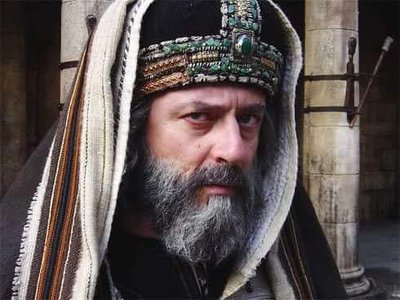Thoughts for the Day
Saturday, 23rd March 2024: 🎇The prophetic warning🎇
John 11 High Priest Lazarus Caiaphas Jesus
Reading : Verses from John, Chapter 11
* The 4th year anniversary of these Thoughts occurs on 24th March 2024 - I would love to hear from you all, to help me keep going for another year!

Many of the Jews therefore, who had come with Mary and had seen what Jesus did, believed in him. But some of them went to the Pharisees and told them what he had done. So the chief priests and the Pharisees called a meeting of the council, and said, ‘What are we to do? This man is performing many signs. If we let him go on like this, everyone will believe in him, and the Romans will come and destroy both our holy place and our nation.’ But one of them, Caiaphas, who was high priest that year, said to them, ‘You know nothing at all! You do not understand that it is better for you to have one man die for the people than to have the whole nation destroyed.’ He did not say this on his own, but being high priest that year he prophesied that Jesus was about to die for the nation, and not for the nation only, but to gather into one the dispersed children of God. So from that day on they planned to put him to death.
Jesus therefore no longer walked about openly among the Jews, but went from there to a town called Ephraim in the region near the wilderness; and he remained there with the disciples.
(Lectionary, New Revised Standard Version)
Thoughts
John's Gospel now traces out the effects of Jesus raising Lazarus from the dead. This amazing 'sign' of God's kingdom meant more and more people believed that Jesus carried out this miracle with power from God Himself, and was the Messiah. But the ruling authority, the Jewish Sanhedrin, in the face of this overwhelming evidence (we are even told that the body of Lazarus stunk after four days in the tomb) stubbornly cling to their unbelief. Why is this so? Well, the Sanhedrin was largely made up of Pharisees and Sadducees. The former were concerned with obeying the Law, and saw that Jesus was breaking too many laws! The latter, the aristocrats of the nation, were the political party and were concerned with keeping the peace. The Roman authorities would not allow any unrest. If this happened they would lose their positions and probably their lives - and the High Priest, Caiaphas, was a Sadducee!
Looking back after 2,000 years we can see that the very thing the Sanhedrin hoped to stop occurred. In 70 CE the Romans destroyed the Temple and the city. The words of Caiaphas: "You do not understand that it is better for you to have one man die for the people than to have the whole nation destroyed", were ironically to become true. It would be better for the people and the world that Jesus died, but it was not a consequence he could see. John sees this as a prophetic speech, for ironically the High Priest was traditionally expected to prophesy to the nation's leaders.
God allows us free will, and all present that day could have made a different choice. We too are given a choice to believe in Jesus as the Messiah, the Son of God. However, we are not given to know the consequences of our choice, that is in God's hand to decide.
Prayer
Almighty God,
You give us free will
to choose our thoughts
and our actions,
even though we cannot see
the consequences of these.
Guide us through Your Spirit
to make wise decisions
for ourselves and others,
that we may follow in Your steps
for the rest of our life.
Amen.
You might like to look at these: